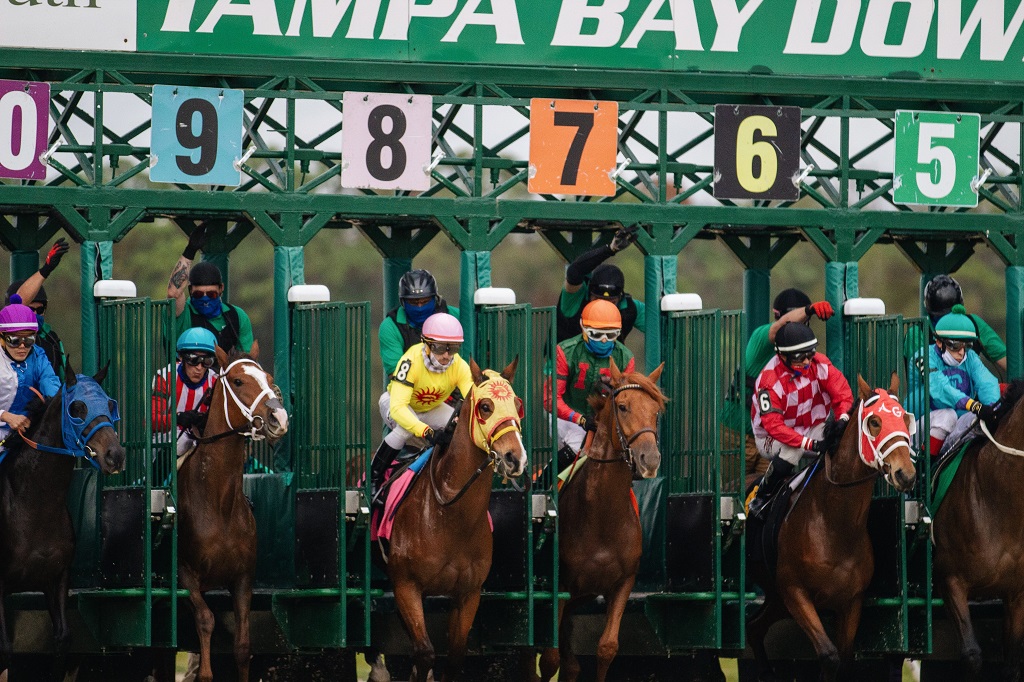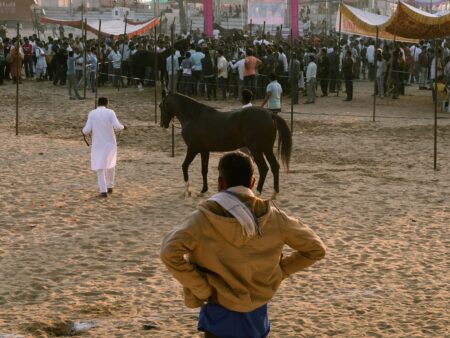In the world of gaming and sports betting, you are likely to have come across a wide array of different exotic betting options. One of which is horse racing betting odds. The first question on most people’s lips tends to be: what are horse racing betting odds? Here’s the answer
What Are Horse Racing Odds?
Horse racing odds, also known as “odds,” are a way of expressing the probability of an event occurring. The odds system is used in horse racing, as well as other sports like football and basketball. It allows you to compare one bet with another in order to determine which has the best value.
In general, there are three types of odds: fractional (decimal), American, and European. Fractional odds are just what they sound like—a fraction whose numerator is the payout amount and whose denominator is the amount wagered. For example, if you bet $1 on a horse at 1/2 odds ($2), then you would receive $3 back if your horse won: $1 wagered plus $2 profit equals $3 total return.
American odds work like fractional odds except that instead of using fractions for the payout ratio, they use whole numbers instead—so if you wagered $1 on a horse at 1/2 odds ($2), then you would receive back $3: your original dollar plus one half of what you won on top of that (50 cents).

How Do They Work?
In general, horse-racing odds are calculated by taking into account how many horses there are in a race and how much money has been placed on each one (the total amount wagered). The higher number of horses in a race and/or the more money placed on each one means that those horses have longer odds—they’re more likely to lose than their competitors in other races with fewer competitors or less money wagered on them—and vice versa for lower numbers of horses or less money wagered on each one.
What Is Horse Racing Oddschecker
Horse Racing Oddschecker is a service that provides racing fans with free and impartial betting advice. They provide live odds, tips and advice on all UK horse racing, including Cheltenham, Aintree and Royal Ascot.
How Do I Read Horse Racing Betting Odds?
Horse racing betting odds are a measurement of the likelihood that a horse will win a race. To understand them, you need to know the basics of what they mean and how they’re calculated.
Let’s look at an example. The odds of a horse winning a race are 9-4, meaning that if you bet $4 on this horse and it wins, you’ll receive $9 in return. If it doesn’t win, you lose your $4 bet but keep whatever winnings you’ve earned from other bets.
So how do we get that number? First, let’s talk about how much money is being wagered on each horse. This is called the “handle.” Let’s say there are 100 bets made on a horse with odds of 9-4, and it wins the race—this would mean that 100 people bet $400 total on this horse (100 x 4 = 400). Now let’s say there are 1,000 bets made on another horse with odds of 3-5—this would mean that 1,000 people bet $1,500 total on this horse (1,000 x 5 = 5,000).
Factors In Setting The Odds
The oddsmaker must consider several factors in setting the odds for each horse. These include:
- The past performance of each horse. The better they have performed in previous races, the higher their odds will be.
- The number of horses running in each race. If there are fewer than 10 horses, then all of them have an equal chance of winning; if there are more than 10, then those with better past performance will have lower odds than those with poorer past performance.
- What other factors may influence a particular race (such as weather or track conditions).
The Most Common Bet Types Explained.
Here we will introduce you to the most common types of horse racing bets. These are:
Placepot:
A bet on which horses will finish in the first four places in order. The odds vary depending on how many horses have already been eliminated from the race and how far they finished behind the winner.
Each Way:
A bet on which horses will finish in any position between first and last place. The odds depend on how many horses are left in the race and where their odds are set by bookmakers.
Win:
A bet on which horse will win a particular race. The odds depend on how many horses are left in the race and where their odds are set by bookmakers.
Show:
Show bets are similar to place bets except that instead of coming in second place, they’re about coming third through the fifth place (or sixth through tenth place if there are more than ten horses entered). If “Comet” comes in fourth instead of second, he’ll pay out as long as no other horse beats him by more than one position.
Where Can I Bet On Horse Racing?
Here are some horse racing tips:
The first place to bet on horse racing is at the track. You can find tracks in almost every state, and they are open year-round for betting.
The second place to bet on horse racing is at a casino. Casinos offer many types of betting, including horse racing. Casinos also offer other gambling options, such as slots and table games, so you can take advantage of almost every type of game you want when you visit a casino.
The last place to bet on horse racing is online. There are many online horse racing bet sites, such as 12xpro, where you can bet on horse races from the comfort of your home or office with just a few clicks of your mouse. 12xpro is a site that offers the best horse racing betting odds and a wide range of races. You can bet on a range of different types of races, including flat and jump racing. In addition, there are many different types of bets available. You can place your bets online using your computer or mobile device.
You can find more information at 12xpro.com.
Region-Wise Odds
Fraction odds
Fraction odds are the most common betting odds used for horse racing tip in the UK, Australia, and many other countries.
Fraction odds can be a little confusing the first time you see them. They’re usually presented as a fraction, and they feature a decimal point in between the numerator and denominator. The numerator represents how much you win on each bet, and the denominator represents how much you lose—so if you bet $10 on a horse with 2:1 odds, for example, then you would win $20 ($10 x 2 = $20) if your horse wins but lose $10 if it doesn’t.
Here’s an example of how to read fraction odds: 1/4 = 4/1 = 25% (1/4) = 4/1 = 25% (4/1). This means that if you were betting on two horses in the same race, one at 1/4 odds and one at 4/1 odds, then both horses have to finish first in order for your bet to win—but if either one finishes second or third, then your bet will lose.
Decimal odds
Decimal odds are most often used in continental Europe, Australia, New Zealand, and Canada.
The decimal is a fraction with a whole number in front of the decimal point. For example, the decimal odds of a horse winning in a race are 4/1.
The first number represents how many dollars must be wagered to win $1 (for example, 1/2 means that $1 would be won by wagering $2). The second number represents how much money is won per dollar bet (for example, 2/1 means that $2 would be won by wagering $1).
American odds
The American odds are very popular in the United States. They are also sometimes known as Moneyline or US odds.
American odds can seem a little confusing at first, but once you understand how they work, you’ll be able to use them to pick winning horse racing bets every time. This guide will explain the different types of American odds and how they are calculated.
In American odds, bookmakers will list three numbers: The win price, place price, and show price. These numbers represent how much money you will receive if you bet on each horse in order from best to worst results. For example, say there are five horses in a race. If you bet $100 on each horse and the winner finishes with a time of 1 minute 30 seconds (1:30), then your payoff would be $1 for every $2 wagered on that horse. That means if you bet $100 on all five horses, then your total payout would be $500 ($100 x 5).
If two or more horses finish at the same time or finish in sequence (for example, 1:30 followed by 1:31), then no one wins the race, and no one gets paid out anything at all! So make sure when placing your bets that you only choose the ones that look like they have a chance of winning!
Hong Kong odds
Hong Kong odds are used by Asian bookmakers. They are also sometimes known as Cantonese or Chinese odds.
Hong Kong’s odds are slightly different from the rest of the world. The horse racing betting odds in Hong Kong are calculated using a different set of factors and data. In order to understand these odds, you’ll need to first understand how they are calculated.
There are four main factors that determine the Hong Kong horse racing betting odds:
1. Track condition: The track conditions in Hong Kong are very different than those in other countries, so the track condition is one of the main factors that determine how much your bet pays out and what kind of odds you get for it.
2. Handicap: Another important factor is whether or not there are any handicaps involved with your bet; if there’s a handicap involved, then it will affect how much money you can win on your bet, as well as how much it pays out at the end of the race or event. 3. Number of horses running in this particular race: If there are more horses running than usual in this race, then it means that there would be less competition for those horses, which means less risk for them but also less chance for profit for bettors because they won’t have as many runners competing against each other which means less profit overall except maybe if you find some really good value bets.







